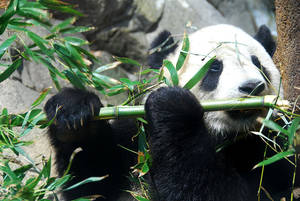Most conservation effort seems to be put into species which are pretty or otherwise attractive to humans, but often there is no point in trying to conserve them if their ecosystem collapses. For example there is no point in stopping anyone killing pandas if the bamboo they live on dies out. In simple cases this result is obvious but in most ecosystems a species depends on, and is dependent upon, many other species. This makes it very hard to predict the knock on effects of loosing a species, without using huge complex computer models.
 According to Stefano Allesina and collegues Google's pagerank might hold the answer. This is the ranking system that Google uses to help decide which order to return search results. Basically if a site has lots of other sites linking to it, especially if they are important, then it is probably important too and should appear at the top of the list.
According to Stefano Allesina and collegues Google's pagerank might hold the answer. This is the ranking system that Google uses to help decide which order to return search results. Basically if a site has lots of other sites linking to it, especially if they are important, then it is probably important too and should appear at the top of the list.
Stefano has been applying this to food webs, so if lions, hyenas, leopards etc all eat a type of gazelle, they will all transfer some of their importance to the gazelle, depending on how much of their diet is gazelle. The gazelle, in turn, transfers importance to the grasses which it eats.
They then used these relationships to rank the species by how much damage they would do if they went extinct, and compared it to other much more complex mathematical models, and found that the results were the same. The Page Rank system is obviously scalable to immensely complex systems - it works for the web, so Stefano's system should work on a food web as complex as they come in the real world, and help conservationists concentrate on the most important species to protect.










Comments
Add a comment